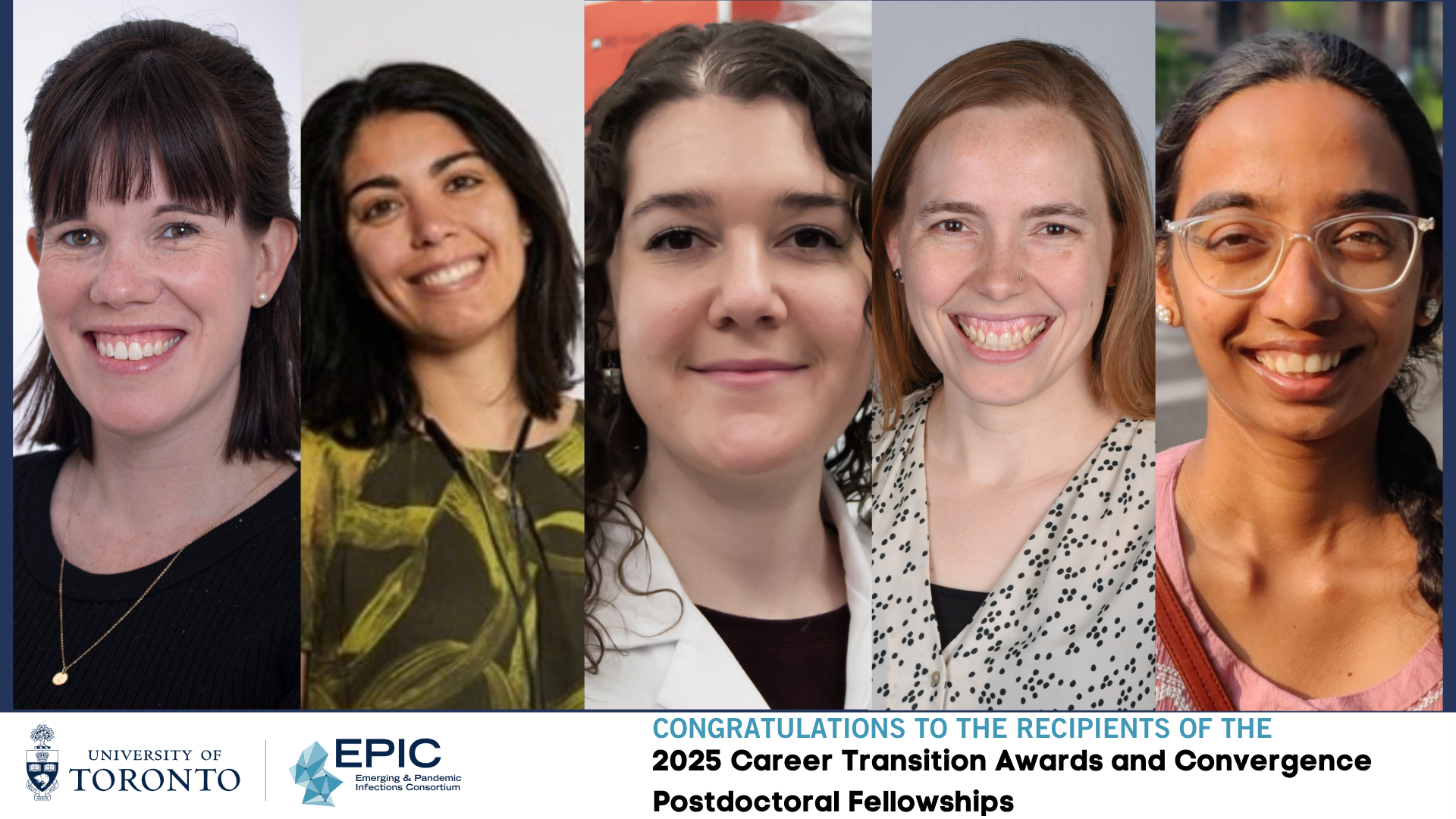From left to right: Clare Burn Aschner, Costanza Di Chiara, Sophie Dyzenhaus, Kirsten Meyer, Shreenidhi Perukkaranai Madabhushi
July 7, 2025
By Sunitha Chari
The University of Toronto’s Emerging & Pandemic Infections Consortium (EPIC) is investing $600,000 in the Career Transition Awards and Convergence Postdoctoral Fellowships to support the next generation of infectious disease researchers across five projects that span disciplines from discovery and clinical research to public health.
EPIC Career Transition Awards support postdoctoral fellows and research associates as they lead their first independent project while being mentored by their supervisor and a dedicated faculty member from the EPIC community. The work is intended to enable these senior trainees to generate proof-of-concept data essential for establishing their independent research careers.
Get to know the recipients of the 2025 EPIC Career Transition Awards:
Clare Burn Aschner is a postdoctoral fellow working with Jean-Philippe Julien, a senior scientist in the molecular medicine program at The Hospital for Sick Children. To prevent the transmission of human cytomegalovirus (HCMV) infections during pregnancy, she will develop HCMV-specific antibodies that can both activate immune responses and cross the placenta to protect babies in the womb from HCMV infections. Her work will inform strategies to prevent the transmission of maternal infections to infants and guide the development of HCMV vaccines for these populations.
Kirsten Meyer is a postdoctoral fellow working with Justin Nodwell at U of T’s Temerty Faculty of Medicine. Having previously shown that bacterial extracellular vesicles (EVs) contain antimicrobial compounds that can specifically target other bacteria, she will explore the molecular mechanisms of this targeting — identifying key lipids and proteins in Streptomyces EVs and understanding how they fuse with microbial membranes. She aims to optimize EVs for targeted antimicrobial delivery, advancing treatments for drug-resistant pathogens.
EPIC Convergence Postdoctoral Fellowships are awarded to senior postdoctoral fellows to develop cross-disciplinary expertise while implementing a project supervised by faculty members with distinct research perspectives.
Meet the 2025 EPIC Convergence Postdoctoral Fellows:
Costanza Di Chiara is a postdoctoral fellow co-supervised by Shaun Morris, a senior scientist in the division of infectious diseases at The Hospital for Sick Children and Shelly Bolotin, an associate professor of epidemiology at the Dalla Lana School of Public Health. Leveraging an existing national network of 16 paediatric centres, Di Chiara will optimize the network’s capacity for maternal-infant health research. Her work fills critical gaps in the Canadian clinical research landscape regarding the detection and impact of infectious diseases, creating a more comprehensive and responsive research platform aimed at improving pandemic preparedness efforts for these vulnerable groups.
Sophie Dyzenhaus is a postdoctoral fellow co-supervised by Scott Gray-Owen, a professor of molecular genetics at U of T’s Temerty Medicine and Freeman Lan, an assistant professor of biomedical engineering at U of T’s Faculty of Applied Science and Engineering. Using single-cell sequencing, she will identify key genes within individual cells of Neisseria gonorrhoeae and investigate how they contribute to bacterial adaptation. Her work has implications for the development of therapeutic strategies that target these genes to curb the spread of antibiotic-resistant gonorrhea.
Shreenidhi Perukkaranai Madabhushi is a postdoctoral fellow co-supervised by Aaron Reinke, an associate professorof molecular genetics at Temerty Medicine and Asher Cutter, a professor of ecology and evolutionary biology at U of T’s Faculty of Arts and Science. Her project will explore the mechanisms by which microsporidia — a fungal parasite — infect certain species of the small worm Caenorhabditis, but not other closely related species. The findings of her research will point to genetic clues related to pathogen host specificity and broaden the understanding of how emerging pathogens adapt to overcome species barriers.
“A quintessential element of EPIC is the exceptional talent within our trainee community,” says Natasha Christie-Holmes, director of strategy and partnerships for EPIC.
“The calibre of the applications we received this year was outstanding across both our postdoctoral and career transitions programs. I’m delighted that we can fund these five immensely talented researchers, supporting them as they make significant scientific contributions and take their next steps in becoming research leaders in infectious diseases.”
For more details, please visit our Career Transition Awards and Convergence Postdoctoral Fellowships funding pages.


